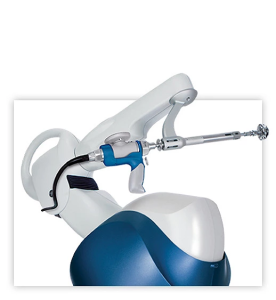Anesthesia services at NMC Health
Anesthesia care at NMC Health is personalized. A credentialed anesthesia provider will be with you throughout your time in the operating room. His or her job is to adjust your anesthetic as needed and monitor your vital signs with the latest technology.
Complications from anesthesia are rare, but they can happen. The team will carefully monitor you during surgery to prevent or promptly treat any potential issue that might arise.
Anesthesia Billing Information
Anesthesia services are provided by a third-party anesthesia company called CCI Anesthesia. NMC Health contracts with this expert team of anesthesiologists. That means you will receive a separate bill for any anesthesia services you might receive at NMC Health. If you have questions about anesthesia or your bill, please call them directly at 800.494.3948.
If you have a medical emergency, call 911 or visit the NMC Health Medical Center Emergency Department.
How anesthesia works
Anesthesia can be given in a number of ways including general anesthesia, regional anesthesia and IV sedation. A number of factors are taken into account when your specific type of anesthesia is chosen. Our team will review your chart, talk with you and talk to your doctor before choosing which type of anesthesia will be right for you.
Our goal is to provide optimal operating conditions for your surgeon and make your experience having surgery at NMC Health as comfortable as possible.
Types of Anesthesia
General Anesthesia
Many times when you have surgery at NMC Health, you’ll be put under general anesthesia. This puts you to sleep, where you are unconscious and don’t feel or remember any part of the procedure.
General anesthesia is given through an IV directly into your blood stream. You might receive additional IV medicine and/or anesthetic gases to maintain your unconscious state. A breathing tube may put in your windpipe.
Rare, but serious risks include:
- Mouth or throat pain
- Hoarseness
- Injury to mouth or teeth
- Awareness under anesthesia
- Injury to blood vessels
- Aspiration
- Pneumonia
- Nausea and vomiting
- Allergic reactions to anesthesia
Nerve Block
Sometimes you will be awake during a procedure, and only the area near where the surgery is happening will need to be deadened. A nerve block is an injection of a drug near a nerve to cause temporary loss of feeling and/or movement to a specific limb or area of the body.
Risks include:
- Infection
- convulsions
- Weakness
- Bleeding
- persistent numbness
- Residual pain
- Injury to blood vessels and/or nerves
Spinal or Epidural Anesthesia
There are a number of reasons you might have a spinal block or an epidural. One of the most common is to ease labor pains when you’re having a baby. Drugs are injected through a needle and catheter placed either directly into your spinal canal or immediately outside of your spinal canal. This will cause a temporary decrease of feeling and/or movement to the lower parts of your body.
Risks include:
- Spinal headache
- Backache
- Ringing in the ears (tinnitis)
- Convulsions
- Infection
- Persistent weakness and/or numbness
- Bleeding
- Residual pain
- Injury to blood vessels or nerves
Monitor Anesthesia Care (MAC)
Not all people are put to sleep during surgery. Some surgeries and procedures call for local or regional anesthesia. For this type of anesthesia, medicine is injected into the blood stream putting you in a semi-conscious state. This is to reduce your anxiety and pain and create partial or total amnesia, so you won’t remember the procedure.
Risks include:
- An unconscious state
- Depressed breathing
- Injury to blood vessels
FAQs
Before you are given any anesthesia, you will be seen by a certified registered nurse anesthetist (CRNA) on your care team. He or she will ask you about any medicines you are taking, if you are allergic to any medicines and if you have ever had a reaction from anesthesia before. They need to know everything you take, including over-the-counter medicines so they can choose the right type of anesthesia for you.
When you fall asleep during general anesthesia, you should not be able to feel or remember anything during surgery.
Your anesthesiologist will put a tube in your mouth to make sure you’re getting enough oxygen during your surgery. While you’re sleeping, your anesthesiologist will monitor your heart rate, your breathing and blood pressure to make sure you are safe. They might adjust the amount of anesthesia they give you to make sure you stay asleep.
It i highly unlikely you will wake up or be aware of anything happening during surgery. Many times, the fear of waking during surgery comes from pop culture movies and television shows about “anesthesia awareness.” While anesthesia awareness does happen, it is extremely rare.
If you are having surgery performed under regional anesthesia, you are more likely to remember some of what happened during your surgery.
When you wake up after having anesthesia, you might have some mild side effects including:
- Dry mouth
- Hoarseness
- Nausea or vomiting
- Headache
- Sore throat
- Sleepiness
- Shivering
- Muscle pain
If any of your side effects cause more than a mild discomfort, speak with your doctor and anesthesiologist before going home so they can help treat those symptoms.
When the surgery is done, your anesthesiologist will stop the medicine and allow your body to wake up on its own. Some people wake up more quickly than others. Others are more sensitive to anesthesia and take longer to wake up.
When you wake up, you’ll probably feel a little groggy and loopy until the anesthesia wears off.
Anesthesia Library

10 Questions with Tad Parsons, DPT

10 Questions with Dr. Ann Hutchison

10 Questions with Michelle Langston, RN, BSN

NMC Health Welcomes Dr. Marc Olivier ‘Marco” Duverseau

NMC Health Patient Calls Surgery “A Game Changer”

The Future of Surgery Beckoned… NMC Health Answered

Successful Surgery Puts NMC Patient Back in the Swing

NMC Welcomes General Surgeon John McEachern, MD, FACS, CWS

DocTalk: Robotic Arm-Assisted Joint Replacement



